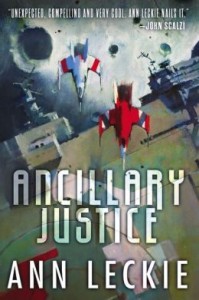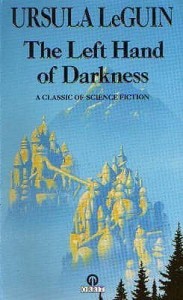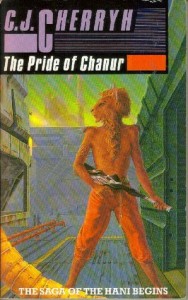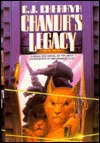SF Lineage: Le Guin Through Cherryh To Leckie
 On March 4 I reported back on my reading of Ann Leckie’s Ancillary Justice, which might fairly be said to have been the SF book-de-jour of 2013-14 in terms of awards and accolades.
On March 4 I reported back on my reading of Ann Leckie’s Ancillary Justice, which might fairly be said to have been the SF book-de-jour of 2013-14 in terms of awards and accolades.
And I, like many other readers and commentators, “mentioned with approval” the way the book plays with our notions of gender by:
“…the Radch Empire’s universal use of the personal pronoun “she” and the gradual realization that all the “she’s” I was meeting could equally well be female or male. After a while I got used to it and just focused on the characters and their stories regardless of gender — but that, you may rightly agree, is an outstanding achievement in and of itself.”
Outstanding, yes, but then I got to thinking—sure, it’s a fresh spin, but is it really something that’s new to SF? And having reflected briefly, I’ve decided that the answer is “no.”
 First off there’s Ursula Le Guin. I have discussed The Left Hand Of Darkness (1969) several times and concluded that it’s hard to beat for the exploration of difference, both sexual and societal–and difference both within the societies of the world, Gethen or “Winter”, but also between Gethen and the off-world space cultures of the Ekumen.
First off there’s Ursula Le Guin. I have discussed The Left Hand Of Darkness (1969) several times and concluded that it’s hard to beat for the exploration of difference, both sexual and societal–and difference both within the societies of the world, Gethen or “Winter”, but also between Gethen and the off-world space cultures of the Ekumen.
Exploration of difference may be Le Guin, effectively, but the important point, I feel is that she does not stand alone in the SF pantheon. When reflecting on what Ann Leckie has done with Ancillary Justice, my thoughts also turned to CJ Cherryh’s Chanur series. The first novel, The Pride of Chanur, was published in 1981, the fifth, Chanur’s Legacy, in 1992. In many ways it’s a better comparison for Ancillary Justice because both are out-and-out space opera. You know, big ships, big guns, big fun—but with more serious themes worked into the mix.
 Like the more recent Ancillary Justice, the Chanur books are very much explorations of the theme of “self and other.” One of the things I like about them is that the ‘verse, Compact Space, is also all about alien species. Humans, in this mix, are barely more than flotsam and as a species never advance beyond the fringe of events. The central characters, all from the Chanur clan, are also all female: in their society, it’s the females who go into space and do all the society’s “heavy lifting.” The implications of this are definitely a theme within the book: more so than Ancillary Justice where the universal “she” of the Radch Empire is simply taken for granted, a matter of fact.
Like the more recent Ancillary Justice, the Chanur books are very much explorations of the theme of “self and other.” One of the things I like about them is that the ‘verse, Compact Space, is also all about alien species. Humans, in this mix, are barely more than flotsam and as a species never advance beyond the fringe of events. The central characters, all from the Chanur clan, are also all female: in their society, it’s the females who go into space and do all the society’s “heavy lifting.” The implications of this are definitely a theme within the book: more so than Ancillary Justice where the universal “she” of the Radch Empire is simply taken for granted, a matter of fact.
Cherryh’s exploration of gender and social difference, however, is not limited to the Hani. In the fifth book, Chanur’s Legacy, a major focus of the story is the Stsho species, which has three genders, about which very little is known, and the general-use personal pronoun is the neutral “gtst”. Since first reading the book, I have adapted its term “gtst-self” whenever I have wanted to communicate a sense of gender neutrality—undoubtedly a tribute to Cherryh’s considerable world-building power. Interestingly, whenever I use it, my meaning is always understood, which although it may be partly context, is also a tribute to the aptness of the term—and again, the powers of CJ Cherryh.
 Then again, maybe I’ve just spent too much time with Finns, who like Ann Leckie’s Radch also get themeselves into trouble with personal pronouns when speaking English. Because in Finnish there are only two pronouns: one for “he/she” and one translating as ” it.”
Then again, maybe I’ve just spent too much time with Finns, who like Ann Leckie’s Radch also get themeselves into trouble with personal pronouns when speaking English. Because in Finnish there are only two pronouns: one for “he/she” and one translating as ” it.”
Returning to Ann Leckie’s considerable achievement with Ancillary Justice, while I thoroughly enjoyed and applaud her fresh spin on the gender theme, I also see it, not so much as something completely new but as the current iteration of a longstanding SF tradition.
 An iteration, one might also say, that was long overdue, given The Left Hand Of Darkness was published in 1969 and the last of the Chanur books in 1992, close on quarter of a century ago. You may well point out other novels or series that have picked up the baton since then (and no, Nicola Griffith’s Ammonite is not a contender—it was also published in 1992) but otherwise I think we all owe Ann Leckie a huge vote of thanks for stepping up.
An iteration, one might also say, that was long overdue, given The Left Hand Of Darkness was published in 1969 and the last of the Chanur books in 1992, close on quarter of a century ago. You may well point out other novels or series that have picked up the baton since then (and no, Nicola Griffith’s Ammonite is not a contender—it was also published in 1992) but otherwise I think we all owe Ann Leckie a huge vote of thanks for stepping up.







